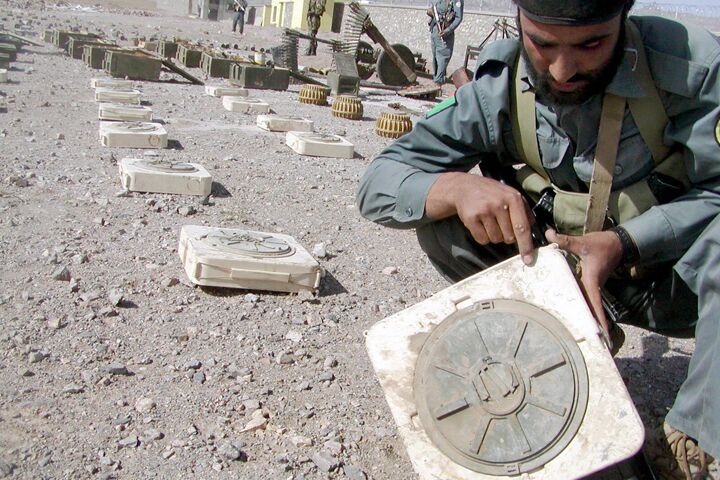
Iran Fuels Afghan Crisis by Arming the Taliban
Afghan police and intelligence agents uncovered 60 Iranian-made mines in a Taliban compound in the Farah province in western Afghanistan on January 24. “We have intelligence reports that these mines had recently entered Farah from Iran,” Farah Governor Mohyiddin Balouch told Agence France Presse. “We know that there is a government in Iran which has controls over the borders. Without the knowledge of the Iranian government it is difficult to send weapons out.”
These mines are only the latest discovery of an accumulating stockpile of Iranian weapons in the possession of the Taliban. Iranian weapons discovered in Taliban caches by Afghan, U.S. and nato officials in recent months include roadside bombs, ak-47s, C-4 plastic explosives, and mortars. United States Ambassador to Afghanistan William Wood told Afghan members of parliament and diplomats on January 30 that Taliban insurgents are unquestionably receiving military arms from the Iranians.
U.S. Defense Secretary Robert Gates told reporters back in June that “given the quantities [of weapons] that we’re seeing, it is difficult to believe that it’s associated with smuggling or the drug business or that it’s taking place without the knowledge of the Iranian government.”
Iranian weapons are being supplied to the Taliban, and some high-level U.S. officials and the Afghan governor of Farah believe that the Iranian government itself is complicit in the smuggling.
Iranian officials, however, deny they have given any aid or arms to the Taliban. Even Afghan President Hamid Karzai has dismissed U.S. accusations and claimed Iran as a friend of the Afghan government. “Iranians have helped us in Afghanistan and I hope this trend will continue. … We have opened our doors to them,” he said.
Well, Iran cannot be a friend of the Afghan government and the Taliban at the same time. Or can it?
In fact, Iran would have much to gain from pursuing a dual-track policy in Afghanistan.
The Taliban is violently anti-Shiite, and Shiism is the dominant Muslim sect in Iran. This was among the reasons Iran and Afghanistan were not on friendly terms under the Afghan Taliban regime that ruled from 1996 to 2001. Iran almost went to war with the Taliban in 1999 over the murder of eight Iranian diplomats by Taliban forces.
Yet for all this past animosity, Iran did a strange thing once the U.S. went to war against the Taliban regime in 2001. According to the transcript of a high-level Taliban official’s tribunal session at Guantanamo Bay, Cuba, Iran made a secret agreement to assist the Taliban in its war against U.S. forces. This Taliban official was unnamed in the report, but U.S. government allegations identify him as the governor of Afghanistan’s Herat province from 1999 to 2001. This official admitted that he was present as a security guide at a secret October 2001 meeting between Taliban and Iranian official where Iran pledged assistance to the Taliban regime in its war against the United States.
Time magazine further reports:
An adviser to [Herat] warlord Ismail Khan told Time that shortly before the U.S. bombing campaign began in October, a high-ranking Iranian official connected to the hard-line Supreme Leader Ayatollah Khameini had been dispatched to Kabul to offer secret sanctuary to Taliban and al Qaeda fugitives. The Iranian official was apparently trapped in Kabul during the bombing, and remained there until the Northern Alliance took control of the city. Although the Iranians despised the Taliban for their persecution of Shiite Muslims in Afghanistan, their hatred for the U.S. may have run deeper.
So high-ranking Iranian officials with links to Supreme Leader Khamenei have been providing arms and aid to the Taliban. Why would Iran aid this former enemy? And why is Iran at the same time providing assistance to the current Afghani government? The Iranians have donated $600 million to various Afghan infrastructure projects since 2001.
In the Iranian mind, the only thing worse than Taliban rule over Afghanistan would be American “rule” over Afghanistan. That is why Tehran is manipulating both sides of the Afghan conflict. Iran limits its support of the Taliban to the point where it can cause chaos without achieving victory. That way it undermines the prospect of a Taliban and an American regime at the same time. The Taliban does not have enough support to win, and America is kept bogged down in a violent quagmire.
Taking things a step further, Iran has also taken advantage of the situation it has helped to create by becoming an ally of the current Afghani government. Its overtures of friendship toward Afghani President Karzai’s administration have cemented it as an ally in Karzai’s eyes. “Afghanistan wishes further progress and development of Iran and will not let anyone drive a wedge between the two Muslim neighbors,” President Karzai said. “We should draw assistance from Iran’s experiences to boost the development drive in Afghanistan.”
Iran is swiftly emerging as the dominant power in the Middle East through intimidation, terrorism, and the manipulative foreign policies of Ayatollah Khamenei. Tehran will take advantage of the chaos that its terrorist proxies have helped create in Afghanistan, Pakistan and Iraq. Expect to see an Iranian caliphate of sorts to emerge. An alliance with Egypt—also progressing along nicely—would then top off the whole situation to make Iran the king of the Middle East.
For more information on Iran’s Middle Eastern ambitions, read The King of the South.
